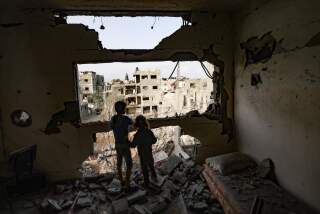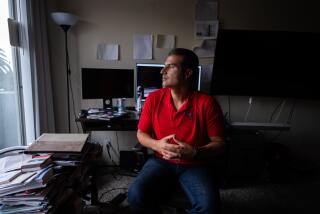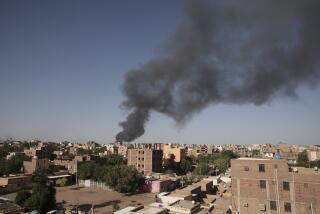American, Young Son Tell of Harrowing Escape
- Share via
WASHINGTON — It wasn’t the quicksand that was so frightening. Or the sandstorms. Or the oil pipelines that loomed suddenly out of the blowing sand.
It was the tanks.
“We were afraid the tanks would fire at us and that would be it,” said Bassam Mohtady, an American who, with his 8-year-old son, crossed the Kuwaiti desert in a caravan of vehicles led by a local Bedouin guide.
“It was like cat and mouse in the desert,” added Mohtady, 34, who arrived with his son, Sammer, in Boston on Sunday.
The 21-vehicle caravan left Kuwait city at 6 a.m. on Aug. 16. Twelve hours later, only six vehicles crossed into Saudi Arabia. Mohtady said he does not know the fate of the 60 other travelers--mostly Kuwaitis, Egyptians and Saudis--who did not make it to the border.
Since Iraq invaded Kuwait 24 days ago, thousands of Kuwaitis and foreign nationals have risked the perils of the desert to escape the Iraqi occupation. Not all have survived.
“We passed by abandoned cars, some with bodies in them,” Mohtady, manager of the World Book Encyclopedia office in Kuwait city, recalled in a telephone interview from his home in Saugus, Mass. But “no one was willing to stop” to find out how they died, he said.
The first four vehicles dropped out of the caravan in a sandstorm a few hours into the trip. Others became so hopelessly mired in quicksand that the power of three Jeeps could not extricate them. Some simply decided that the dunes and hardscrabble desert were too dangerous and turned around.
But Mohtady, driving in a Jeep with his son, a Kuwaiti professor and the professor’s two American children, kept on. His passengers played electronic games to pass the time and drank cold water to offset the 130-degree heat.
They traversed deep ditches dug by the Iraqis to prevent escaping vehicles from going farther. They drove for miles along oil pipelines looking for places where enough sand had piled up against the 3-foot-high pipes so that the caravan could cross over.
The worst moment came when the caravan was surrounded by Iraqi tanks. “They had a big circle around us,” Mohtady’s son, Sammer, recalled. But a providential sandstorm rose up off the desert, obscured the Jeeps and cars from the tank’s viewfinders, “and we just went through them,” he said.
The caravan did not escape gunfire, however. As the few remaining vehicles approached the Kuwaiti border, an Iraqi Jeep patrol opened fire on them with machine guns.
Although bullets broke Mohtady’s windows, no one was injured, he said.
After passing through the Saudi border checkpoint, the caravan split up. Mohtady drove on to Dubai in the United Arab Emirates, where he abandoned the Jeep and bought tickets home to the States. He and his son were greeted by his wife, Kathleen, when they arrived at Boston’s Logan International Airport.
Mohtady, who was born in Kuwait but is a naturalized American citizen, said he ventured the escape in part because of frustration with the options available. The day before he left, the U.S. Embassy held a meeting in which Americans were advised to sit tight and keep in touch with each other by telephone. Mohtady had been serving as a warden responsible for staying in contact with 17 other Americans.
After the meeting Mohtady became disheartened. “I was putting so much hope on them (the embassy) to get us out of there,” he recalled. “But since they had no plans to get us out of there, I had to make my own.”
He said that when he left 10 days earlier, no Americans were suffering from food shortages and were mostly free to travel within the city. Kuwaitis and foreigners alike were congregating in a few apartments with family and friends and most homes were abandoned. The day Mohtady left, Iraq ordered foreigners to report to hotels, although most ignored the order.
For the first two weeks of the invasion, “I never planned to go to Saudi Arabia,” he said. “But I knew that if I stayed in Kuwait I was history and that if I left, at least I had a chance.”
His son is less philosophical about the escape. “It was fun,” he said.
More to Read
Sign up for Essential California
The most important California stories and recommendations in your inbox every morning.
You may occasionally receive promotional content from the Los Angeles Times.










